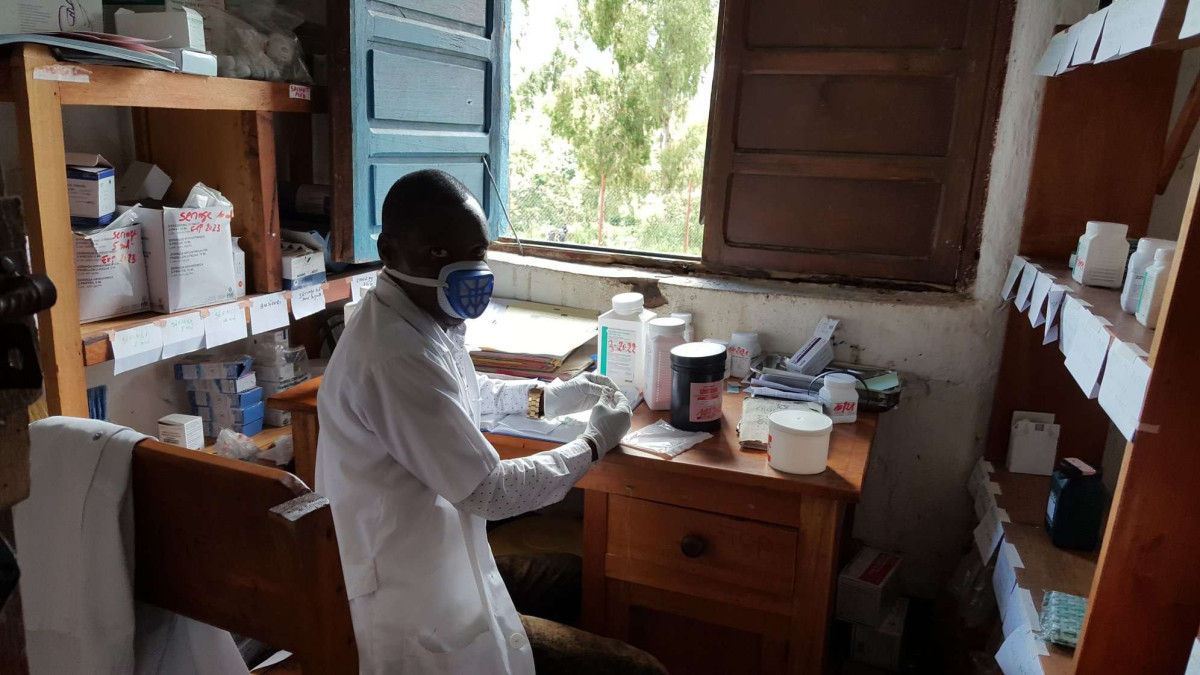Providing free healthcare in the Democratic Republic of the Congo and preparing communities for COVID-19
Published: Apr 9, 2020 Reading time: 4 minutes Share: Share an articleOver the past 10 years, the Lemera Health Zone in the eastern part of the Democratic Republic of the Congo (DRC) has been the site of numerous conflicts between armed groups, leading to the frequent displacement of civilians. The majority of the population does not have access to basic healthcare, and there are shortages of essential medicines at medical facilities, which are able to provide only limited support for victims of sexual and gender-based violence. As a result, the health of people living in this remote area has deteriorated significantly, even when compared to other parts of South Kivu Province.

"I had excruciating abdominal pain after childbirth, and no one could help me,” says Aline, a 29-year-old mother of six who lives in the area. “At the hospital, I would have needed to pay a lot of money to be examined, but because of my financial situation, I had to stay home and give myself up to my fate."
Children in the Lemera Health Zone are struggling as well; nearly 10 percent of children under the age of five suffer from acute undernutrition, and a staggering 34 percent who seek treatment never recover.
To help improve these conditions, People in Need (PIN) teamed up with Doctors of the World Belgium to improve access to and the quality of primary healthcare services, and to provide nutrition treatment to the most vulnerable people in the Katala, Mulengue, and Ndegu health areas. Thanks to funding from the European Union’s Civil Protection and Humanitarian Aid Operations (ECHO), PIN has been supporting communities in the Lemera Health Zone since June 2019.
Free and high-quality healthcare for more than 30,000 people
"When I learned that the health center was treating the sick free of charge, I came in with my baby,” Aline recalls. “We were well received, and the nurses took care of us. Thanks to this support, I regained my health and my malnourished child joined the free nutrition program here at the health center."
As part of the project, PIN delivers medicines and equipment to local health facilities, and supports the hiring of local doctors, midwives, and nutritional nurses, who help ensure that services are delivered at a high standard. “Over 30,900 people – including children under the age of five, and pregnant and lactating women – have directly benefited from the free and high-quality healthcare we are providing,” says PIN DRC Program Manager Sébastien Kervyn, who adds that returnees to the area or people who have been displaced by conflict are the most vulnerable.
The program is also committed to community health and outreach through the provision of screenings for Severe Acute Malnutrition and educational activities to raise public awareness on topics such as breastfeeding and Ebola. “We are also working to improve hygiene through the distribution of sanitation materials, the restoration of health facilities, and enhanced waste management to prevent and control the transmission of infections,” says Kervyn.
Preparing health centers and communities to prevent the spread of COVID-19
The situation has become even more difficult due to the COVID-19 outbreak. “At this stage there are no confirmed COVID-19 cases in the Lemera Health Zone, but our intervention has been adjusted in line with international and national measures to prevent the spread of COVID-19,” says Sébastien Kervyn. Concretely, it means that all mass awareness-raising activities were suspended and individual counselling is prioritized.
The exterior of the health centers has been arranged in a way that patients will not be gathered in crowds and cannot enter the center in groups. People are entering the facility one by one in order to respect a safe physical distance and to avoid grouping in waiting rooms.
“We are installing handwashing points at the entrance and inside the health centers, and facilities are receiving hygienic materials like soap, water buckets and more,” Sébastien Kervyn explains, continuing that “Personal protective equipment like masks have been distributed to health care providers and hydro-alcoholic gel will be delivered to places where there is no water.”
Health centers are also getting prepared to treat people who may have COVID-19. “Health centers are using electronic thermometers for temperature screening and subsequent sorting of patients. In case the patient is symptomatic and at risk, the person will be isolated in a ventilated room installed in the health center, and care will always take place at the facility level,” Kervyn explains. “A questionnaire will be administered to the patient in order to determine his medical and epidemiological anamnesis. If cases of COVID-19 are confirmed, the health department of the province will be alerted,” he adds.
The focus is also on prevention and awareness-raising at the community level. Posters in Swahili on COVID-19 are outside health centers and in strategic locations in the community. All project staff and health care providers of the community have been briefed. “We created Swahili leaflets for the communities. They are provided at focal points, and community leaders have been trained to sensitize the community about the coronavirus and how to prevent it,” says Kervyn, adding that communities are being trained on COVID-19 case definition and detection.









